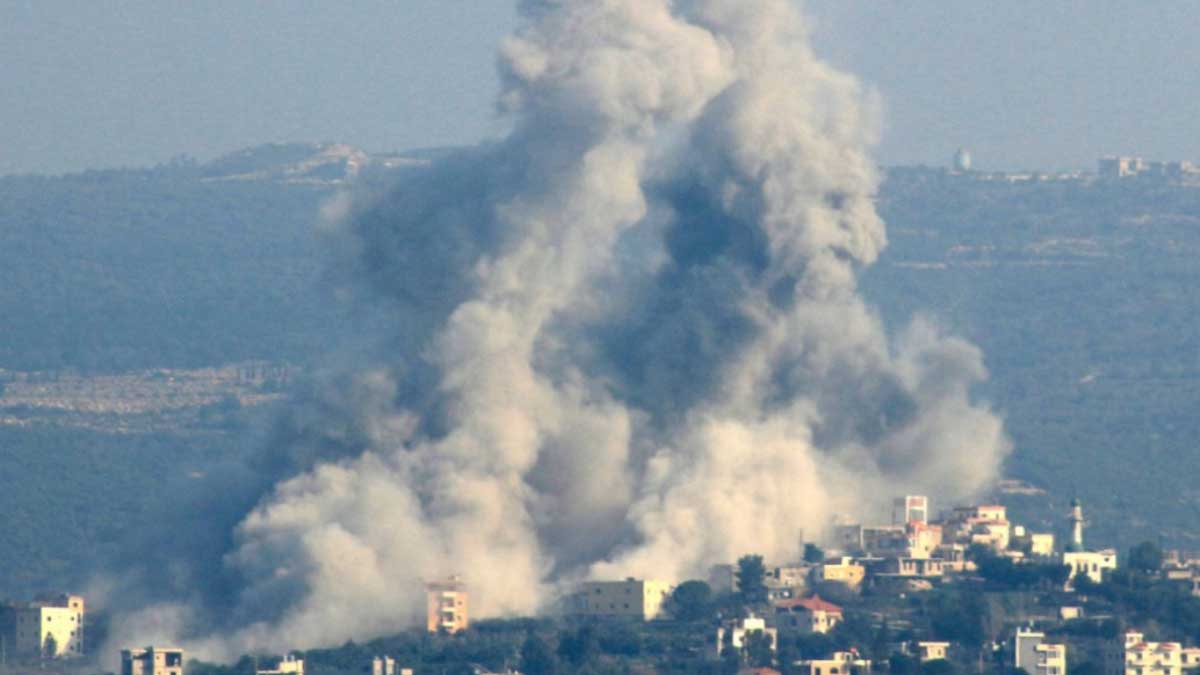- Home
- Billionaires
- Investing Newsletters
- 193CC 1000
- Article Layout 2
- Article Layout 3
- Article Layout 4
- Article Layout 5
- Article Layout 6
- Article Layout 7
- Article Layout 8
- Article Layout 9
- Article Layout 10
- Article Layout 11
- Article Layout 12
- Article Layout 13
- Article Layout 14
- Article Sidebar
- Post Format
- pages
- Archive Layouts
- Post Gallery
- Post Video Background
- Post Review
- Sponsored Post
- Leadership
- Business
- Money
- Small Business
- Innovation
- Shop
Recent Posts
Israel’s Deadliest Strikes Target Hezbollah in Lebanon

The Israeli military has launched a significant wave of airstrikes against Hezbollah in Lebanon, marking the deadliest day in Lebanon since the onset of hostilities between Israel and the militant group in October. On Monday, the Israeli Defense Forces (IDF) announced they had struck more than 300 Hezbollah targets, killing at least 100 people and injuring more than 400 others. The intensity of these strikes represents Israel’s most extensive air campaign against Hezbollah since the conflict began. Israel’s latest operation comes amidst escalating tensions with Hezbollah, an Iran-backed militant organization that holds significant political and military influence in Lebanon. According to reports from Reuters, these strikes represent the largest and most coordinated bombardment by Israel in this ongoing conflict. The latest airstrikes hit multiple Hezbollah positions across Lebanon, including the eastern region where Hezbollah operates. As Israel escalates its campaign, it issued warnings to civilians in Lebanon to evacuate areas where Hezbollah operates, highlighting the severity of the current situation.
The IDF, through its spokesperson Daniel Hagari, issued an “advanced warning” to Lebanese civilians located in and near Hezbollah positions to evacuate immediately for their own safety. The warning, addressed specifically to villages in eastern Lebanon, underscored the risks civilians face due to Hezbollah’s use of civilian structures for military purposes. The Israeli military also published a map highlighting 19 villages and towns in southern Lebanon that were identified as potential targets. However, the IDF did not specify whether all of these locations would be attacked or if all residents needed to evacuate. This marks the first time Israel has issued evacuation orders for Lebanese civilians during its conflicts with Hezbollah. The significance of these warnings suggests Israel is preparing for a broader and potentially more intense military campaign against Hezbollah. The Israeli military has already launched several waves of aerial bombardments, and it has not ruled out a possible ground invasion. Hagari stated that Israel’s current operations are focused on aerial strikes, but he did not explicitly deny the possibility of escalating the conflict through ground incursions, indicating that Israel “will do whatever is needed” to ensure its objectives are met.
Hezbollah’s retaliatory actions against Israel have been swift and intense. Just one day before Israel’s most recent airstrikes, Hezbollah launched more than 100 rockets into northern Israel, further escalating the conflict. This exchange of fire follows a series of strikes by Israel over the weekend, which targeted senior Hezbollah leadership, including Ibrahim Aqil, a prominent Hezbollah figure accused by the United States of involvement in terror attacks in the 1980s that killed hundreds of Americans. Earlier in the week, hundreds of pagers used by Hezbollah members exploded simultaneously across Lebanon and parts of Syria, reportedly killing at least 12 people and injuring over 2,750. Lebanese officials attributed the explosions to Israeli actions, although Israel has not publicly claimed responsibility for the attacks. In response to these events, Hezbollah leaders vowed to retaliate, with the group’s leadership calling for more aggressive strikes against Israeli targets. This ongoing tit-for-tat between Hezbollah and Israel has raised concerns about the possibility of the conflict spiraling out of control.
The deepening conflict has drawn international attention, particularly from the United States, which remains a close ally of Israel. On Sunday, Israeli Defense Minister Yoav Gallant held discussions with U.S. Defense Secretary Lloyd Austin to provide an assessment of the situation on the ground and discuss strategies to neutralize Hezbollah’s ability to launch attacks against Israeli civilians. Gallant also expressed concerns about the broader regional threats posed by Iran and its network of proxy groups, including Hezbollah. The intensifying hostilities between Israel and Hezbollah have also prompted cautionary statements from U.S. officials, who fear the conflict could escalate into a larger regional war. John Kirby, the White House National Security Council spokesperson, told ABC News on Sunday that the U.S. government was doing everything possible to prevent the situation from escalating into a full-scale war between Israel and Hezbollah. He emphasized the critical importance of de-escalation efforts and diplomatic measures to reduce the risk of a broader conflict involving neighboring countries.
The ongoing violence between Israel and Hezbollah is part of a broader, more complex regional conflict involving Israel’s military operations against multiple militant groups. While Israel has been engaged in a protracted war with Hamas in Gaza, the conflict with Hezbollah presents a distinct threat due to Hezbollah’s military capabilities and the group’s strong ties to Iran. Hezbollah has repeatedly vowed to stand in opposition to Israel, and the group remains one of the most formidable non-state actors in the region, with access to advanced weaponry and support from Tehran. Israeli Prime Minister Benjamin Netanyahu has expressed his government’s resolve to protect northern Israeli towns and villages that have been directly impacted by Hezbollah’s attacks. Thousands of Israelis have fled their homes in the northern part of the country as a result of the escalating violence, and Netanyahu has vowed to take all necessary measures to ensure their safe return. The Israeli government has also been reinforcing its military presence along the border with Lebanon, preparing for further confrontations.
The ongoing conflict between Israel and Hezbollah has the potential to escalate into a much broader regional war, especially if Hezbollah continues to increase its attacks on northern Israel. Although Israel has largely focused its military efforts on Hezbollah’s infrastructure in Lebanon, the broader implications of the conflict, particularly in relation to Iran’s involvement, remain a significant concern for global powers. The risk of a multi-front war, with Israel engaged in both Gaza and Lebanon, looms large as diplomatic efforts attempt to contain the violence. The coming days will be critical in determining whether the conflict between Israel and Hezbollah remains localized or expands into a larger regional confrontation. As Israel continues to launch airstrikes and Hezbollah retaliates, the international community will be closely monitoring the situation to prevent further destabilization in an already volatile region. The stakes are high, with the potential for mass casualties and widespread destruction if the conflict escalates beyond its current scope.
Recent Posts
Categories
- 193cc Digital Assets2
- 5G1
- Aerospace & Defense46
- AI37
- Arts3
- Banking & Insurance11
- Big Data3
- Billionaires449
- Boats & Planes1
- Business328
- Careers13
- Cars & Bikes76
- CEO Network1
- CFO Network17
- CHRO Network1
- CIO Network1
- Cloud10
- CMO Network18
- Commercial Real Estate7
- Consultant1
- Consumer Tech180
- CxO1
- Cybersecurity68
- Dining1
- Diversity, Equity & Inclusion4
- Education7
- Energy8
- Enterprise Tech29
- Events11
- Fintech1
- Food & Drink2
- Franchises1
- Freelance1
- Future Of Work2
- Games141
- GIG1
- Healthcare78
- Hollywood & Entertainment186
- Houses1
- Innovation42
- Investing2
- Investing Newsletters4
- Leadership65
- Lifestyle11
- Manufacturing1
- Markets20
- Media193
- Mobile phone1
- Money13
- Personal Finance2
- Policy567
- Real Estate1
- Research6
- Retail1
- Retirement1
- Small Business1
- SportsMoney33
- Style & Beauty1
- Success Income1
- Taxes2
- Travel10
- Uncategorized8
- Vices1
- Watches & Jewelry2
- world's billionaires418
Related Articles
Trump Moves $4B Stake in Truth Social Parent, Stock Drops 6%
Donald Trump recently transferred his 57% stake in Trump Media & Technology...
By 193cc Agency CouncilDecember 20, 2024House Rejects Trump-Backed Funding Bill, Shutdown Looms
The U.S. House of Representatives rejected a new government funding bill on...
By 193cc Agency CouncilDecember 20, 2024Trump Named Time’s Person of the Year for Second Time
On Thursday, Time magazine honored Donald Trump as its “Person of the...
By 193cc Agency CouncilDecember 12, 2024Meta Donates $1 Million to Trump’s Inaugural Fund
Meta, the parent company of Facebook and Instagram, has confirmed a $1...
By 193cc Agency CouncilDecember 12, 2024















Leave a comment